Welcome to Hard Time Blues: The World of Pro Wrestling from Merry-Go-Round Magazine! It’s a great time to get into professional wrestling. In each Hard Time Blues feature, MGRM contributors Luke Phillips and Maxwell Flynn will be exploring the wild, weird, and wooly world of the squared circle, and all of the angles, feuds, gossip, and evil wizards therein.
This week, Luke and Maxwell talk to Brooklyn’s Jobber, a new power pop ensemble that just so happens to have a wrestling gimmick. Formed by Kate Meizner and Mike Falcone, Jobber are inspired by the independent pro wrestling scene, and Meizner incorporates wrestling lingo in her lyrics, writing songs inspired by classic wrestling themes. We discussed the parallels between DIY music scenes and pro wrestling, the potential for the two to be united, and much more in this conversation. Jobber’s HELL IN A CELL EP is out on Exploding in Sound October 21st, you can check it out over on Bandcamp!
LUKE PHILLIPS: One of the reasons we started the column is because we think now more than ever is a really good time to get into pro wrestling if you haven’t been into it before. It was just exhausting to cover up until a certain point. We’ve been covering mostly AEW and WWE and all the backstage shit is just like, at a complete fever pitch.
KATE MEIZNER: I know. And then it’s like, you’re also trying to be tapped into the local indies on top of that. And this season I haven’t been following baseball as much, but I’m also a baseball fan. And when it’s like baseball and also multiple wrestling promotions, it just flies outta control. Also, I watch so much reality TV, like THE BACHELORETTE.
LP: I think with this column we both reached our breaking point with like, AEW’s All Out. We were just like, we don’t wanna talk about any of this at this clip.
MAXWELL FLYNN: Yeah. Last month with all the Vince McMahon stuff and then this month with all the AEW melting down stuff, it just became so much. I was like, we gotta take a break on the recaps. We can watch it. I just can’t talk about it with that much urgency.
LP: It just so happens that our other collective passion is music, mine specifically power pop, and here comes along a power pop wrestling gimmick band. It’s perfect. We kind of wanted to eventually kind of pivot to just talking to artists, or wrestlers, or people in the industry about wrestling. Wrestling is kind of trendy online right now, there just needs to be something that threads the needle between other pop culture and wrestling. Like, I consider wrestling a creative industry, right? It’s just like the music industry.
MEIZNER: I’ve been thinking about this a lot and a lot of my lyrics and stuff are about this, from a labor perspective. People are talking in music about fair pay and unionizing and those same conversations are happening in local indies and wrestling. Wrestling promotions forming unions; I feel like it’s because the jobs are so similar. Other than the fact that, you know, wrestlers are putting their bodies on the line for their work. Like, you’re performing, you’re traveling from city to city. You don’t sleep, you make shit, shit money, you’re somewhat disrespected creatively.
LP: And every wrestler being an independent contractor is something that is absolutely fascinating to me. Being someone whose day job is in the music industry, and knowing so many artists who operate essentially as gig workers or workers who are living paycheck to paycheck or taking whatever gigs they can take. It’s similar. Not to mention, so many artists are also into wrestling, you know?
MEIZNER: It’s true. Speaking of power pop and wrestling: I know for a fact that Tony Molina is into wrestling.
LP: I didn’t know that. We’d love to talk to Tony about wrestling.
MEIZNER: We used to be in a punk message board together with a bunch of, like, old punk heads.
LP: We’ve covered Mo Troper from Portland on MGRM. He’s really good friends with Tony; Mo doesn’t watch wrestling, but like, pretty much all—Mo’s told me this—like all of his best friends and confidants watch wrestling, which includes me.
FALCONE: He’s just right on the cusp of it.
LP: Yeah, like everyone feeds him wrestling stuff. I’ve been showing him MJF promos and he fucking loves MJF.
FALCONE: MJF’s really easy to get into.
LP: Oh yeah. MJF especially is such a good kind of gateway wrestler.
MEIZNER: I just love that he never breaks character. Literally he posted on Instagram, like, “Happy birthday to my fiance or whatever.”
MF: They just got engaged today and he had said something about, like, “Oh, ladies, don’t worry about, you know, hooking up with me. Just keep trying. It’s fine.”
LP: Yeah. “Just because there’s a goalie it doesn’t mean you can’t take a shot.”
MF: Yeah, exactly. He makes it so easy to hate him, that he’s just a perfect character to kind of dive into with wrestling.
LP: What converted Mo was that promo with Punk where he gave almost a face promo, where he went into his like super villain origin story and how he faced anti-semitism from CM Punk fans, which was crazy! That was incredibly affecting wrestling television. That’s some of the most insane shit I’ve seen in the last several years on live TV.
MEIZNER: I think actually MJF was on one of the first wrestling shows that we went to together. Where we were kinda forming our love of pro wrestling.
FALCONE: Are you guys in Brooklyn?
MF: No, California.
LP: Yeah. I’m based out of Los Angeles. And Maxwell is based out of the San Francisco area.
FALCONE: I think the show we went to—was the show we went to in Brooklyn or Queens?
MEIZNER: It was in Queens and MJF wrestled and I’m pretty sure there was like, something with Wheatus?
MF: Oh, that was at the GCW show where Wheatus performed for Spider Nate Webb to come out.
FALCONE: That was the first time I ever saw MJF.
MF: GCW is another one of these indie promotions that is really drawing people in. I think they’re helping put it out there in pop culture, because they’re doing a lot tying music into it and tying different subcultures into it that a lot of these other promotions aren’t really utilizing. They’re on the forefront of it, which is very cool.
LP: Totally. With that in mind we couldn’t have picked a better first artist to talk to than, you know, Jobber. I mean, it’s absolutely perfect.
MEIZNER: Unless you figured out how to get in touch with The Mountain Goats.
LP: Or ICP, or like Master P… Bad Bunny even… Action Bronson; Action Bronson wrestled at Grand Slam and it was fucking awesome. It’s so crazy. I love that Action Bronson is an active competitor.
FALCONE: Oh yeah we just saw that!
LP: Let’s start talking about the band and your upcoming EP, HELL IN A CELL. Obviously, the wrestling gimmick is intrinsic to the band and all of your lyrics. You guys were essentially creating fake entrance themes when you wrote a lot of these songs. The instrumentation is based on wrestling themes. That’s extra cool. If you wanna just kind of expound on the genesis of the band and how that relates to the parallels between the music industry and the wrestling industry, I think that’s a really cool place to start.
MEIZNER: I used to play guitar in this band called Potty Mouth, essentially as a touring guitarist. I was touring quite a bit. There was one fall where I was on back-to-back tours and I was getting really into listening to podcasts about wrestling. I listened to Renee Paquette’s podcast—Moxley’s wife, obviously, and famed WWE commentator. So I was listening to her podcast a lot and just kind of hearing stories from wrestlers and sitting in this band. I was kind of like, “Wow, music should really be incorporating more wrestling gimmicks.” It could be so much entertaining for us as musicians if we had really overt kayfabe feuds with other bands.
MF: Oh, definitely. That would be incredible.
LP: I think that’s a lot of fun.
MEIZNER: It kinda started as a joke where I was just talking to the other members of Potty Mouth in the van about it. But it’s something I always thought would be funny to do, like a band to take on some sort of wrestling persona. And up until then I’d kind of been playing in a lot of other people’s bands, I’d just finished grad school and started my first full time adult-ass job. And I had all this pent up creative energy and when I got back I was like, “All right, I’m gonna get myself back into songwriting.” I was doing this writing exercise that I just totally made up, which is to write entrance themes for a bunch of fictional wrestlers. That’s kind of what I was thinking when I wrote the music. I didn’t write the lyrics until much later—I don’t really fuck with lyrics until the song is pretty, pretty developed.
So I just started writing like, entrance themes for wrestlers, including my own entrance theme. A lot of them are truly terrible and will never see the light of day—just campy. But I also wanted to explore genres this way because different wrestlers—like face and heel wrestlers—have different types of entrances. So I would say that yeah, our first single’s power pop, but like, you’re gonna see a bit of—
FALCONE: Some people might be surprised by the next song…
MEIZNER: There’s like a heel theme that we wrote… so it kind of covers a lot of different genre bases. I was making this transition from touring quite a bit and doing music a lot to this full-time job. I was starting to just get pissed off at the fact that I had to work and couldn’t dedicate as much time to music, and a lot of the lyrics relate to labor and the connection between being a musician and the life of a wrestler, but also just being a low rung contractor at a tech company.
LP: You’re using a lot of wrestling lingo and terminology that you only pick up once you become more seeped in the culture and the crazy lexicon. Getting into wrestling kind of constitutes creating this almost projected reality with kayfabe—there’s so many different terms, and a lot of it is just, like, weird carney lingo. So it’s really funny that you’re talking about, like, ring rust or, putting yourself over in a song, but relating that to labor issues and the gig economy. I think it makes perfect sense.
MEIZNER: Yeah, definitely. The song you’re referring to about—“Ring Rust”—it was like, I wrote those lyrics after listening to the TALK IS JERICHO episode with Jon Moxley, where he basically shat on his entire experience in the WWE. He talked about a lot of the labor issues, like how they would force him to do these stupid promos where they’d have him bend over and have like, a doctor give him a shot in his ass, and Vince McMahon was like, “That’s good shit.” You know? And I kind of wrote that song with a villain akin to Vince McMahon in mind.
LP: It’s funny, because in kayfabe and for shoot, Vince is the ultimate evil boss. Like, that’s the character he plays on TV, but he’s also really living the gimmick. He’s a real life Mr. Burns. It makes sense why he’s friends with Trump, you know? His wife was in the Trump administration and everything.
FALCONE: I guess in real life, Mr. Burns would probably be friends with Donald Trump.
LP: Oh, 100%. The entire wrestling industry, on base, feels like the ultimate libertarian project, you know? Like, there’s absolutely no union. The thought of it at all is totally verboten.
MF: I mean, it’s literally a business where the strongest people “survive”…
LP: Literally. It’s literally about getting yourself over. Like, you have to get yourself over.
MEIZNER: Yeah. You’re going into business for yourself.
FALCONE: I don’t know, does each wrestler have their own individual LLC or something? Are they each their own company?
MF: A lot of the independent wrestlers have started trying to copyright their stuff and that was a big problem when WWE was picking up a lot of independent wrestlers. They wanted to be copywriting their names—the WWE wanted to own their literal birth names and everything.
LP: WWE has really trademarked some wrestlers birth names—like, they own John Cena’s birth name.
MEIZNER: They wrecked Chyna’s life, right? Like when Chyna left and they still owned the rights to her name and then she basically couldn’t do anything else.
LP: Yeah, it’s incredibly craven and extremely evil.
MF: You were talking about it being such a labor issue, it’s gotten to the point where WWE wanted to stop wrestlers from being able to have Twitch streams and these outside income sources.
MEIZNER: They stopped them from doing Cameos.
MF: Exactly. And that they’re independent contractors but are being stopped from making money on the outside. It’s just, it’s mind blowing that they try to treat people like that.
LP: This is kind of something that CM Punk alluded to on Twitter—despite all of the other shenanigans surrounding him right now—that if wrestlers had a united voice, like if the wrestlers actually tried to unionize, I think they would be unstoppable. They’re the talent. If the talent was threatening to quit and unionized, I think the promotions would have to bend to them, you know?
MEIZNER: I know. And then it’s such an issue in the bigger promotions where they’d actually have a lot of sway over what happens, and like the indies and what would happen throughout the industry. For example, if AEW were to unionize that would just have a ripple effect. But the only problem is that the pay disparity between, say, the women who are wrestling, or NXT-level wrestlers, compared to the top guys is so severe… like inherently, the class solidarity issue is not there, and that’s what drives forward a lot of unionization efforts, that the class interests are aligned. But when the top guys are making so much money, they’re willing to say, like, “Sufferin’ succotash!” or whatever. They’re just willing to keep the plane in the air, drink the Kool-Aid, and do whatever dumb shit that Vince McMahon and his cronies want them to. As long as they’re willing to just put up with it, it kind of hurts everyone else. And so that’s why I’ve been thinking there’s gonna be more success at an indie level, to get people to unionize, because people are experiencing the same struggles, you know? There’s interesting stuff happening in New York, at least with that. I don’t know how much I’m able to say…
LP: They’re trying to get that promotion off the ground with Freddie Prinze Jr. He said that he wants all of his wrestlers in his promotion—which, for the record I think he said it’s probably still at least a year away from when he is targeting to even launch anything—but he said he wants all of his wrestlers to be SAG-AFTRA members. Which would be crazy.
MEIZNER: That’s smart!
MF: That would set an insane precedent for the rest of the industry as well.
LP: I feel like that could be the ripple effect. Like, if Freddie Prinze Jr. can get a promotion off the ground and on TV and if his wrestlers are SAG-AFTRA, then I could theoretically see someone like Tony Khan being like, “Okay, yeah, I have to create a wrestler’s union” or even, here, have my wrestlers be SAG-AFTRA members too.
MEIZNER: It also allows for wrestlers to be a part of stage/screen actors unions as opposed to an athletic union—every state has different standards, but what I know about New York is that the athletic commission has so many specific rules about how you’re allowed to put on a wrestling event, like what you need to have.
MF: Yeah, you’re absolutely right.
MEIZNER: By framing them as performers—I mean, they’re like actors doing performance in that way—it’s a way to skirt around those rules too. So that’s kind of fucking brilliant.
LP: They need to be paid like fucking stunt doubles, you know? Like, that’s what they do. They’re doing live stunt choreography essentially. That’s how I’ve always seen it.
MF: Yeah, that’s why Christopher Daniels worked so well on the Waterworld show.
LP: Yeah. I saw Christopher Daniels when he was playing The Deacon in the WATERWORLD stage show at Universal Studios Hollywood.
MEIZNER: Oh my gosh, I did not know that!
MF: Yeah. He did that up until recently too.
LP: It was post-TNA and then maybe for the first like six months of AEW, I think really before his backstage role really solidified, he was working at Universal Studios Hollywood playing the Dennis Hopper character in the WATERWORLD stunt show. I guess he liked doing that and they were paying, you know, stunt guy rates or whatever. That was like, I think, a union gig.
MEIZNER: Yeah. I was really optimistic about AEW when they were like, “we’re giving our wrestlers health insurance.”
MF: Right. I was gonna bring that up. That was a very big talking point during the inception of AEW and it kinda fell to the wayside.
LP: There was a lot of very sunny, rosy things with AEW that were talked about back in the inception of it—like, “oh, we have all of these queer and LGBT wrestlers” and it’s like, where? Where are they booked? Where are they?
MEIZNER: Yeah and at the end of the day, it’s like a private company that’s owned by a billionaire.
LP: Right? And you can’t trust any of that. Even if at the same time they’ve done some very compelling wrestling, I think much like every other facet of the industry, there’s just so many other kinds of overlaying factors that just muscle their way in the product and in the greater cultural or internet milieu. It just creates an insane environment. I mean at this point they really are speed running WCW, which is really fun, I guess.
MEIZNER: It’s so interesting. The more I learn about how wrestling works—we want to book a few wrestling matches for our EP release show and want them to wrestle in between bands—but booking wrestling is an entirely different animal than bands.
LP: I always kind of wondered what that side of the industry was like. For me, personally for indie wrestling in my area, I’ve been mostly going to all the GCW shows. GCW runs out of LA like every other month. Otherwise for LA promotions, there’s PWG, but all of those shows are so fucking expensive—
MEIZNER: Don’t they sell out immediately?
MF: Yeah, definitely.
LP: Every ticket is always like a hundred dollars and it’s like, well, I’ll see PWG at some point, you know? I really like going to all the GCW shows. Maxwell has been going to West Coast Pro shows—we just covered the West Coast Cup for our last column. What local promotions around Brooklyn do you guys go to?
MEIZNER: So we obviously went to that GCW show. I’ve been to some Evolve shows, but more recently the person who photographed our album art, her name is Sophie Vasquez. She photographs a lot of indie wrestling around here, but also traveled to Pittsburgh, which apparently has a great scene, as well as Indiana and Texas. She’s taken shots of Danhausen and Mox, her photography is incredible.
So she did our EP photos and she was like, “Hey, like I know this guy who runs a wrestling school close by in Bushwick,” which is where I live. “Do you wanna come to one of the wrestling school events?” And I went, and not only were there wrestlers who go to the school, like students showcasing their work, but also—do you know CPA? CPA wrestled. There’s this whole scene of wrestlers who are kind of around the school. It’s called Technique to Training. And there’s a wrestling promotion called IWW—Industrial World Wrestling. Sounds like IWW Workers of the World… They do a lot of things like bar, no ring bar wrestling. There’s a guy named Casanova Valentine who does like, death matches. So we went to one of those. I also saw Zach Sabre Jr. wrestle like one of the Best Friends at a bar. They were doing like backflips off of the bar
MF: I’ve seen some of the no ring deathmatches on the internet and that just seems so intense to be there live. I go to Hoodslam occasionally because I’m right outside of Oakland and even that is like… doesn’t start until nine, it’s standing room only, it’s loud and the lights are down. It’s like a club environment with a ring in the middle of the room. It’s intense and you know, it kind of goes with this idea of different types of wrestling providing something for different crowds, which is totally cool.
MEIZNER: Really it feels like you’re at a DIY show, and I like the energy of that. When it’s a no ring situation in a really unconventional location it’s like the same type of excitement I got when I was a kid and seeing bands for the first time. Because wrestling is still all about seeing very small local matches. It’s still relatively new for me—like the past, say, three or four years. So I just get this excitement. Mike and I went to one at a brewery in the Bronx that the photographer who did our art put together and it was just such a well booked card. There was this whole Philadelphia/New Jersey versus the Bronx thing going on with some of the wrestlers. There’s this one wrestler, the Big Game Leroy, who wrestles with a Nintendo Switch as a prop. Like, broken up video game consoles. He’ll start hitting someone with N64 controllers…
FALCONE: Didn’t they start out the match by playing Mario Kart or something?
MEIZNER: Yeah, yeah. They were like, fighting each other by playing Mario Kart. It was great.
LP: I love that, that rules. There was a no ring promotion in LA called Street Fight LA, but I think they kind of stopped doing things after quarantine. I went to a couple of their older shows though and it was awesome. They would run shows in abandoned bars and theaters and shit, and they would do GCW after shows. It was crazy. I love the bar wrestling environment. Anytime you can see wrestling in a really interesting venue it’s great. All of the GCW shows in LA are run out of the Ukrainian Cultural Center, which is an insane room. It looks like you’re in a fighting game arena or something.
FALCONE: That sounds amazing.
MEIZNER: Oh my God, next time I’m in LA I’m gonna have to go, because I’ve been trying to go to PWG, so whatever local stuff I could get that’s something I’m gonna do now when I start to travel. I love these unconventional locations because you could tell the wrestlers are looking around and they’re like, “What can I climb? Like, what can I do?” There were porta potties at this brewery and for one spot, both dudes went into the same porta potty and then suddenly the door busted open and he like—I think it was like Killian McMurphy—just fell out onto the ground. It almost felt like watching JACKASS or something, it’s always porta potties exploding, it was incredible… someone was climbing up the side of the industrial equipment at the brewery.
FALCONE: That bar match was extremely violent.
MEIZNER: Oh yeah. It was a death match.
FALCONE: Yeah. It’s not gonna be anything like that if we have wrestling at our release show, but I’d be curious to see what a lot of these people’s first impression of a show like that would be. 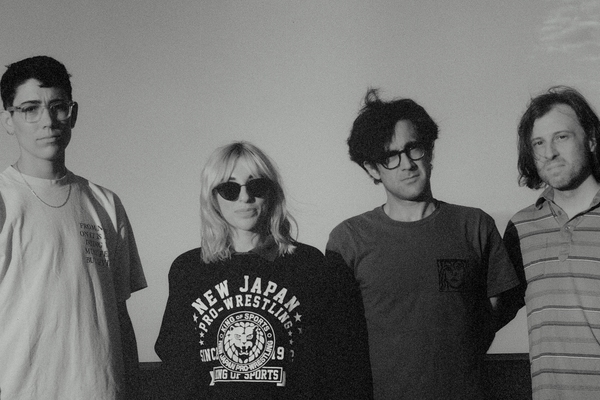
MEIZNER: Yeah. The indie rock scene merging with the local wrestling—like no ring wrestling,
FALCONE: Like, it would be their first time seeing it.
MEIZNER: It’d be an interesting confluence of scenes and we’d be a flies on the wall, like, alright…
FALCONE: Would they know how they’re supposed to react or like…
MEIZNER: We would have to teach them!
MF: Well, I mean, the power of the professional wrestler is to get people into it without any instruction. You know, you gotta have the energy to get the fans to do what you want.
LP: It takes a good wrestling worker, but I’d think it’s pretty easy. I’ve been in situations where I’ve seen wrestling in a random place that a lot of people who don’t usually watch wrestling are milling around. There’s this promotion called Lucha Vavoom in LA. They had a ring set up and they were doing random matches at LA Taco Fest—like the LA Weekly Taco Fest. They had a ring set up in the parking lot. If you just put a good match together with two good workers and they just do a good standard wrestling match, people will immediately get it, you know?
MF: I think what wrestler wrestling just demands is a participatory crowd reaction, you know? Like, hopefully it could get people riled up for the show.
MEIZNER: That’s what we were thinking, we were like—you know, this would be a great way to kick off the show and get people in a good energetic zone for the rest of the night.
FALCONE: We hope so.
MEIZNER: And all the bands that are playing are super upbeat as well and kind of punk and fun. It’d be up to the wrestlers, but also up to us as people who know wrestling to set the tone for that—if it happened. I’m just really excited to see what happens. I don’t know if there’s ever been a wrestling match at an indie rock show like this, like at a music venue or for a show. I guess it could also scary because like the athletic commission could easily show up and shut the shit down.
LP: You never know what’s gonna happen…
MF: David Bixenspan could show up and call the Fire Commissioner…
MEIZNER: We could have a fake New York City Athletic Commission show up.
FALCONE: Oh my god…
LP: There you go! A gimmicked athletic commission…
MF: Oh yeah, somebody comes in and shuts down the show…
MEIZNER: Yeah, yeah. We need a district attorney to show up and then just suddenly get in the ring and get involved.
FALCONE: Singing ICP’s set from Woodstock ‘99.
LP: I’m a Juggalo. I’m from Michigan, I love that. Whoop whoop.
FALCONE: I don’t know that much about ICP, but that set won me over for sure.
LP: I mean, they’re a band that people wouldn’t think of, but they’re incredible live. ICP started out as backyard wrestlers in Detroit before they were even rappers, in the 80s. Their rap career started as a way for them to book wrestling shows. And then they got famous backwards, like, the thing that they did to promote their wrestling shows got them on a record label and eventually they got signed to a major label and they ended up becoming musicians instead of wrestlers. But then, you know, they did WCW and JCW after that anyway. They’re standard bearers in intersecting the wrestling and music worlds.
It’s really funny, thinking about how I personally got into wrestling. Music played a big part in it, you know? There’s that promotion Kaiju Big Battel out of Boston. I had a Kaiju Big Battel DVD when I was 13 years old and Piebald was on it, like they had Piebald performing live at a Kaiju Big Battel show. And that was such a crazy thing because it not only helped me get into wrestling, but it got me into Piebald too, you know? I was probably 12 or 13 years old.
MEIZNER: Yeah, music has always been such a big part of wrestling for me, and what got me back into wrestling after a really long period of not watching it. I would watch it with the neighborhood kids growing up and I knew what was going on, and I was into it a lot. I grew up in central Connecticut—a lot of people were into wrestling there. But getting back into it, I was in a band and the guitarist in our band did, like, music supervision at WWE and would have to watch all of the Raws, all like the SmackDown episodes, all the pay-per-views, and kind of tag when songs were played so that artist could obviously get paid and get their publishing fees. So I would just start watching with her. She was like, “Do you wanna come over and watch WrestleMania?” And the one that I happened to watch is when Seth Rollins cashed in his Money in the Bank. I think it was WrestleMania… it was at, uh, 2014…
FALCONE: Maybe 2015.
MEIZNER: 2015. He cashed in his Money in the Bank and I lost my shit and was like, “I’m back into this, this grabbed me.” I revisited a bunch of entrance themes, like WCW ones, and it was just such a big part of the songwriting process for the EP, especially WCW. They had a knack for taking popular songs of the moment and inverting two chords and then being like…
MF: Oh, just doing the best rip-offs of them. Absolutely.
MEIZNER: Yeah, yeah! The DDP one, “Self Highfive” is literally “Smells Like Teen Spirit” with two of the chords changed,
MF: Yeah, the guy who does the music for AEW does an incredible job doing rip-offs as well. I’m always blown away by Toni Storm’s just incredible knockoff “Barracuda” by Heart.
LP: It’s basically “Barracuda” without being “Barracuda!”
MEIZNER: The CFO Money, like the WWE guys, I don’t think they do it anymore…
MF: Yeah, they got scrapped a few years ago.
LP: Yeah, it’s literally someone they found on SoundCloud, like in Orlando.
MEIZNER: Wow. Uh, that’s why WWE entrances have gone really downhill since then. They used to have themes that kicked ass .
LP: Yeah. Like maybe now that Triple H’s in charge, they’ll start using Poppy again. I liked when Poppy was constantly on NXT.
MEIZNER: There was a Turnstile song, it was like an NXT show theme.
LP: And Code Orange did the theme music for The Fiend!
FALCONE: Integrity for Aleister Black…
MEIZNER: There was someone who used to be in the Jesus and Mary Chain who did Bray Wyatt’s, like the original Wyatt Family theme.
MF: Oh, that fireflies one?
MEIZNER: Yeah. Well, and I always thought that was a really cool entrance theme, and then I was like, oh wow, this guy produced the Jesus and Mary Chain.
MF: That’s super funny because I always heard they just bought the song from a random noname artist. But I mean, I guess whoever wrote the article or the comment where I read that didn’t know who he was, but it’s wild to find out he does have a pedigree like that.
MEIZNER: Do you guys know who did Darby Allen’s entrance music because it’s really cool.
LP: Oh yeah. Wicca Phase Springs Eternal.
MEIZNER: Seriously? That’s cool.
FALCONE: I’m pretty sure it’s supposed to sound like “Sweet Dreams” by Marilyn Manson.
LP: I always thought that might be him singing, but I’m like—is Darby singing his entrance? Like, it sounds just like his promo voice. I don’t know.
MF: It always reminded me of the fake Bauhaus song from SOUTH PARK.
LP: I think Darby is fine as a wrestler, but like the whole… I never really like, loved his promos. I mean, it’s funny when he, you know, puts himself in a body bag and falls like 40 stories or whatever, but the whole, “I slept in my car… I lived in a van down by the river,” like, come on.
MEIZNER: I feel like Jon Moxley does that, but so much better.
LP: Moxley has so much more authenticity to the way he presents himself.
MEIZNER: He’s my fave, I got his book. I haven’t started reading it.
LP: I love the book. I love in the book how much shit he talks about WWE management and how much he hates Kevin Dunn. Really funny, sarcastic, passive aggressive passages in that book from Mox. Moxley just seems like the coolest guy, you know? It makes sense because Renee is super cool. They just seem like they’re the coolest couple in wrestling.
MEIZNER: Well, yeah. When they were on TOTAL DIVAS. I had to stop watching TOTAL DIVAS after they left the show because it was just Jon Moxley, like just being a random character on these stupid excursions. And like, he just drank the whole time. I’m glad he’s better, because in the show he did drink a lot. But he kinda made the show for me. There was this one where, back when Bryan Danielson was Daniel Bryan in WWE, he and Brie Bella took Renee and Jon Moxley on this retreat to see some sort of spiritual guide or shaman, and they were all sitting in a teepee and there was a guy with a didgeridoo playing some song and Jon Moxley is just cracking up, everyone else is there with their eyes closed and he’s just dying.
LP: I loved whenever Daniel Bryan was doing mushrooms or microdosing on TOTAL BELLAS, or talking about going on psychedelic trips. Incredible. Outside of just being incredible wrestlers those two guys especially are such interesting, funny guys in their own right. I don’t really feel like they’re portraying a character really.
MEIZNER: It’s just like, in essence—their own exaggerated essence.
LP: They’re living the gimmick for sure. And like, I think they definitely just kind of turn it on a little bit, you know, whenever they’re in the ring.
MEIZNER: Oh, Daniel Bryan cares about the environment? Okay, he’ll be like, an eco terrorist.
MF: I was gonna say, that championship run he had where he scrapped the belt and he had, instead of leather he had the wood and hemp belt; to me that was insanely incredible wrestling.
LP: Bryan and Punk are just so good at being heels who you can cheer for or root for. MJF is kind of on that level now, like MJF is almost doing that by accident, right?
MEIZNER: People like cheering for him even though they’re supposed to be booing him and it’s kinda like, oh man, he’s so hateable and so punchable. But at the same time it’s, he’s just wonderful.
FALCONE: Cause he’s so punchable!
MEIZNER: You know who’s wasted potential? Who has the same exaggerated essence of their own personality or, like, projection of their own personality, is Sami Zayn. It’s tragic, because he’s such a good wrestler, he’s so charismatic and really funny. And it’s like dude, you gotta get out of there.
MF: The Sami Zayn JACKASS match from WrestleMania is still one of the highlights of the year for me.
LP: Legitimately. I think the Sami Zayn/Johnny Knoxville match from WrestleMania this past year was maybe the best comedy wrestling match I’ve ever seen. Like, it was literally just live action LOONEY TUNES bits. And I know Sami and Kevin’s contracts were up at the beginning of this year and they both took huge fucking bags—which good for them, you know? And it sucks that Sami doesn’t wrestle, but the angles that they do put Sami in, he makes the most out of every single thing he does, you know? It’s so funny how right now he’s doing that Honorary Uce angle. I feel like Kevin Owens and Sami both took big bags from WWE just to be good hands. I think they’re making the most of it and I’m happy for those guys. They still get huge WrestleMania features and they still get put in funny, interesting angles. Even if they’re not competing for belts or anything, they’re still able to be super entertaining. Do I wanna see Sami Zayn and Nakamura putting on bangers every night? Like, yeah, absolutely! But you know, I also just like Sami doing this weird Che Guevara or Castro gimmick, it’s incredible.
MEIZNER: That’s been going on for quite a while and I’m just glad that they stuck with it and didn’t give it up, because it’s really good. You know, he’s always been such a good comedy wrestler. Like even in DDT when they would do the campground wrestling and he would be on a kayak with a paddle, like going down a river rapid with another guy on a kayak next to him and he’d be hitting the other guy with a paddle.
LP: In the last like, 20 years, or at least the last decade of wrestling—and this has probably coincided with the rise of the internet and kayfabe not really being a thing anymore—I think you’ve seen a lot more of doubling down on goofy, comedy wrestling and super gimmicks, meme gimmicks. We just saw Luigi Primo on DYNAMITE several weeks in a row.
MEIZNER: I just bought his freaking t-shirt like, 10 minutes before I got on this Zoom call. Luigi Primo! When he was saying, “I’m’a Luigi Primo,” and got like, just kicked in the face! I am all for comedy wrestling. There’s this promotion—I don’t know if they’ve done anything recently since the lockdown—but at South by Southwest, it was when I was there playing in Hellraiser, it’s called Party World ‘Rasslin, and they do these epic comedy wrestling shows and do their main PPV right around SXSW, so it’s like packed. I’m pretty sure Luigi Primo was there as an evil pizza chef versus an evil barista and it was like three heels. It was like, the evil conductor of the North American Railroad Association—an evil train conductor—and like this… evil barista? And then Luigi Primo. The wrestling was terrible. It was just random people rolling around in the ring. But I still get so much joy out of gimmick wrestling and just gimmicks in general. I’m just like, feed it to me, you know?
LP: That’s the fun thing about wrestling and watching it in a live setting. Kind of like you’ve been mentioning, you really have to give yourself over to the entire performance. Especially with the crowd, you gotta be part of the Greek chorus of it all, you know? I think that’s a really fascinating concept in the medium of wrestling that you don’t really see in a lot of other mediums—especially in music and stuff. If people at gigs got as rowdy as people do at wrestling shows, like during a fucking set, bands would be walking off stage constantly.
MEIZNER: But that’s all I want! Like, at shows, I’m just like, “Can you please boo us?” I feel like there’s all of these habituated things about indie rock or DIY shows of things people do and they all kind of run in the same way, and they’re predictable. I’m just so excited to bring wrestling into that and completely shatter that level of predictability in the show, and people there will hopefully experience something completely new that they’ve never seen or experience before, and that’s what’s so exciting about wrestling.
FALCONE: That’s the goal.
LP: Yeah, maybe this is the start of bridging the gap between indie rock and punk rock and wrestling shows. Uniting in the fact that we’re all just gig economy workers essentially. You mentioned before about starting kayfabe feuds with other bands and stuff. I think that’s a fascinating concept, especially with Twitter and everything. I remember 20 years ago when, like, I think it was Island Records—The Killers, Fall Out Boy, and The Bravery were all on Island, and I feel like MTV planted articles about how, “Oh, these bands hate each other.” They planted inter-band feuds as stories just to promote all of these bands that were on the same label together.
MEIZNER: Oh, they did that with The Hives, The Strokes, and The Vines too! And they would be like “All of the bands are battling.”
LP: That like, Meet Me in the Bathroom-era was so dramatic. Just like wrestling.
MEIZNER: Oh yeah, the Meet Me in the Bathroom-era, I, we’ve been trying to convince our friend to start a podcast that’s Meet Me in the Bathroom, but the 2010 to like 2017 New York City indie rock with all of the stupid unpacking minutia of the DIY venues closing and the people who ran them…
LP: I think that would be great. I mean, we’re almost coming up on a decade past when all of that stuff was vintage, you know? I think that’s definitely a very interesting era to look at in hindsight.
FALCONE: It’s because of how boring rock music was then. Rap didn’t even need to worry about it because those feuds were just happening on their own.
LP: Oh yeah, it was taking care of itself, you know? It was a self-defeating organism.
MEIZNER: I have this theory that in a local scene, I actually think it’s good for local music communities to have fake feuds because drama is just magnetic, and if there’s a lot of bands that are new and upcoming and a local community and they have these fake feuds with one another and people are following them and invested, that’s a community unto itself. Just like creating lore. And that’s something I’m just experimenting with here.
MF: I think you’re definitely onto something with that. I mean, it goes to show, AEW had the highest ratings of the entire year without the Elite and without CM Punk because people wanna watch it to see “is there gonna be drama relating to the drama?” Like, it gets eyes because people love the drama and a good feud for sure.
LP: Yeah. I remember when I was in high school, that’s how local bands would drum up hype for gigs and stuff. They would get into fake feuds on MySpace. That is ingenious. I think you need to shoot a promo and just start shooting on Speedy Ortiz.
FALCONE: Yeah. Great idea.
MEIZNER: We could manufacture some drama if we wanted.
FALCONE: The Stove feud kind of failed a little bit. That was that video that Stove was in…
MEIZNER: Yeah. There’s a band that’s kind of new that started around when Jobber started, maybe a little after, but they don’t have any music online yet. They’re an amazing band, even though I hate them! And we have a manufactured feud right now with the band Customer to get people to come to our EP release show, and then we’re gonna follow it up at our release show and do a whole, like “We’ll see you at WrestleMania thing,” like point to the sign.
LP: Yeah, you need to cut a total heel promo on that band and bury them. You gotta bury them.
MEIZNER: Good idea for a show promo.
FALCONE: It works out well when you have another show with the same band coming up, which we do.
LP: You can do the rubber match at another gig down the line.
Jobber’s EP HELL IN A CELL is out on Exploding in Sounds on 10/21! You can check it out on Bandcamp!


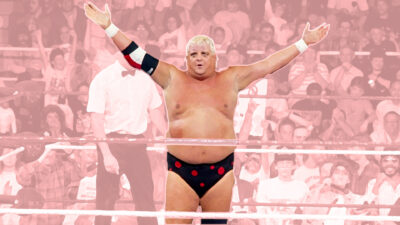
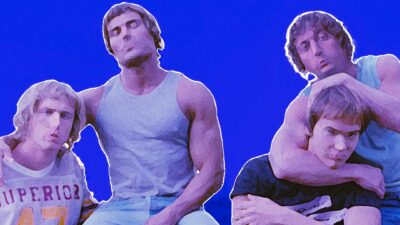
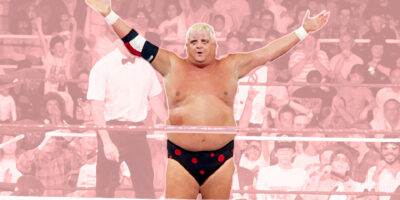

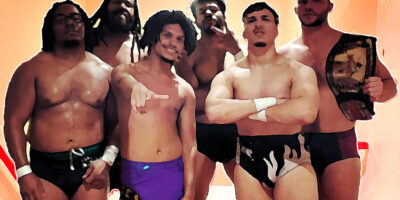
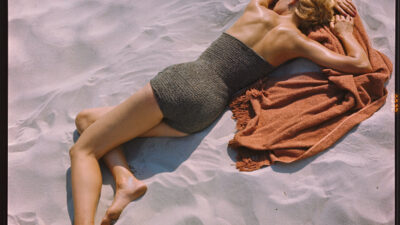


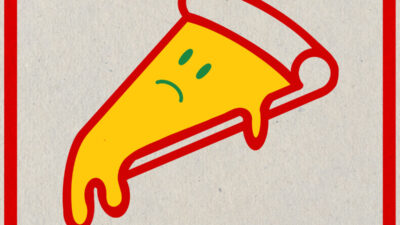
Comments